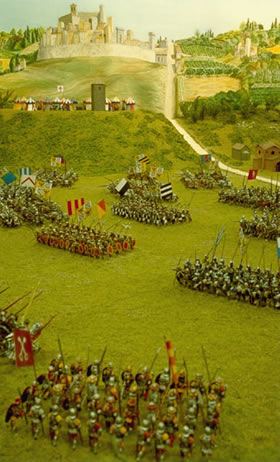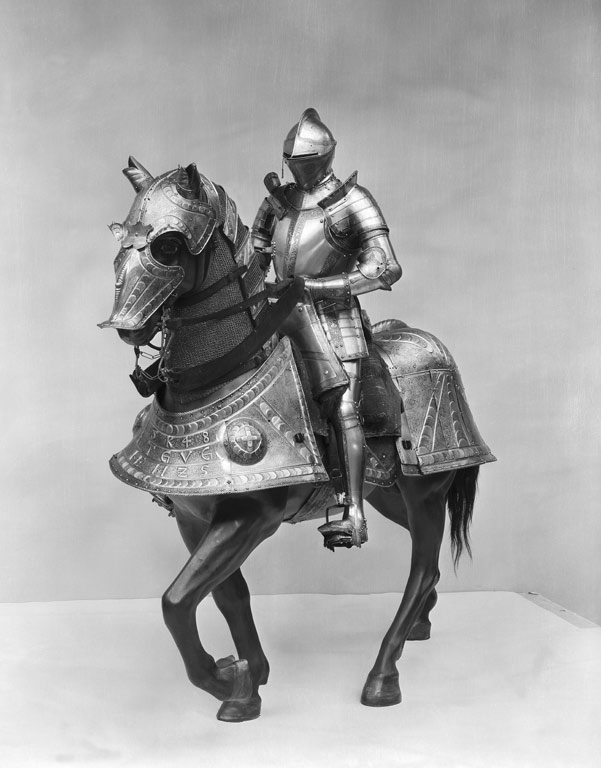A military discipline when everyone acts according to his own convenience
Latest update:
Apparently, the Italians have their very own way to fight in battles.
29 Jun, 1440:
"the Florentines [4000 troops + 300 knights from Venice], under their
commissaries, had drawn together their forces, and being joined by
those of the pope [4000 troops also], halted at Anghiari, a castle
placed at the foot of the mountains that divide the Val di Tavere from
the Val di Chiane [...]"

"As the Signory had heard of the count’s victory and the recall of
Niccolo [who was hired by Filippo Visconti, the duke of Milan], they
imagined that without again drawing a sword or disturbing the dust
under their horses’ feet, the victory was their own, and the war at an
end, they wrote to the commissaries, desiring them to avoid an
engagement, as Niccolo could not remain much longer in Tuscany.
These instructions coming to the knowledge of [Niccolo] Piccinino, and
perceiving the necessity of his speedy return, to leave nothing
unattempted, he determined to engage the enemy, expecting to find them
unprepared, and not disposed for battle. [...]
Niccolo then led his forces [1100 troops + 2000 men from the
nearby town Borgo] in battle array toward Anghiari, and had arrived
within two miles of the place, when Micheletto Attendulo observed
great clouds of dust, and conjecturing at once, that it must be
occasioned by the enemy’s approach, immediately called the troops to
arms."

"[...] The battle continued two hours, during which each side had
frequent possession of the bridge, and their attempts upon it were
attended with equal success; but on both sides of the river, the
disadvantage of Niccolo was manifest; for when his people crossed the
bridge, they found the enemy unbroken, and the ground being leveled,
they could manœuvre without difficulty, and the weary be relieved by
such as were fresh.
But when the Florentines crossed, Niccolo could not relieve those that
were harassed, on account of the hindrance interposed by the ditches
and embankments on each side of the road; thus whenever his troops got
possession of the bridge, they were soon repulsed by the fresh forces
of the Florentines; but when the bridge was taken by the Florentines,
and they passed over and proceeded upon the road, Niccolo having no
opportunity to reinforce his troops, being prevented by the
impetuosity of the enemy and the inconvenience of the ground, the rear
guard became mingled with the van, and occasioned the utmost confusion
and disorder; they were forced to flee, and hastened at full speed
toward the Borgo.
The Florentine troops fell upon the plunder, which was very valuable
in horses, prisoners, and military stores, for not more than a
thousand of the enemy’s cavalry reached the town. The people of the
Borgo, who had followed Niccolo in the hope of plunder, became booty
themselves, all of them being taken, and obliged to pay a ransom. [...]
This victory was much more advantageous to the Florentines than
injurious to the duke; for, had they been conquered, Tuscany would
have been his own; but he, by his defeat, only lost the horses and
accoutrements of his army, which could be replaced without any very
serious expense.
Nor was there ever an instance of wars being carried on in an enemy’s
country with less injury to the assailants than at this; for in so
great a defeat, and in a battle which continued four hours, only one
man died, and he, not from wounds inflicted by hostile weapons, or
any honorable means, but, having fallen from his horse, was trampled
to death.
Combatants then engaged with little danger; being nearly all mounted,
covered with armor, and preserved from death whenever they chose to
surrender, there was no necessity for risking their lives; while
fighting, their armor defended them, and when they could resist no
longer, they yielded and were safe."

"This battle, from the circumstances which attended and followed it,
presents a striking example of the wretched state of military
discipline in those times.
The enemy’s forces being defeated and driven into the Borgo, the
commissaries desired to pursue them, in order to make the victory
complete, but not a single condottiere or soldier would obey,
alleging, as a sufficient reason for their refusal, that they must
take care of the booty and attend to their wounded; and, what is still
more surprising, the next day, without permission from the
commissaries, or the least regard for their commanders, they went to
Arezzo, and, having secured their plunder, returned to Anghiari; a
thing so contrary to military order and all subordination, that the
merest shadow of a regular army would easily and most justly have
wrested from them the victory they had so undeservedly obtained.
Added to this, the men-at-arms [knights], or heavy-armed horse, who
had been taken prisoners, whom the commissaries wished to be detained
that they might not rejoin the enemy, were set at liberty, contrary to
their orders.
It is astonishing, that an army so constructed should have sufficient
energy to obtain the victory, or that any should be found so imbecile
as to allow such a disorderly rabble to vanquish them."
(From History of Florence, Book V, Chapter VII by Niccolo
Machiavelli.)
Tags: quote, italy
Authors: ag